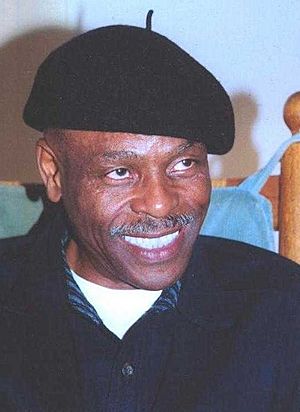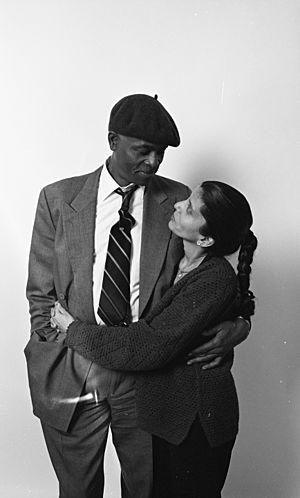B. Kwaku Duren facts for kids
Quick facts for kids
B. Kwaku Duren
|
|
|---|---|
 |
|
| Born | April 14, 1943 Beckley, West Virginia, U.S.
|
| Education | People's College of Law (JD) |
| Occupation | Attorney |
| Political party | Black Panther Party Peace and Freedom Party New Panther Vanguard Movement |
| Spouse(s) | Married four times |
| Children | Seth, Andrea, Kwamé, Sarika |
B. Kwaku Duren (born April 14, 1943), also known as Robert Donaldson Duren and Bob D. Duren, is an African American lawyer, educator, writer, and activist. He has been involved in social and political movements for a long time. He lives and works in South Central Los Angeles.
As a young man, Duren spent almost five years in California prisons. While there, he started reading a lot and taking college classes. After he was released in 1970, he helped start the National Poor People's Congress. A few years later, he and his younger sister, Betty Scott, along with other community members, founded an alternative school called the Intercommunal Youth Institute (1972–1975) in Long Beach, California.
After his sister's death in 1975, Duren helped create the Coalition Against Police Abuse (CAPA). He was a co-chair of this group from 1975 to 1977. From 1976 to 1981, he was the Coordinator for the Southern California Chapter of the Black Panther Party (SCC/BPP). He also worked for the Los Angeles Legal Aid Foundation for many years, helping people with legal issues. He became a lawyer in 1990 and has worked as a "people's" lawyer and community activist ever since.
Contents
Early Life and Education
B. Kwaku Duren was born on April 14, 1943, in Beckley, West Virginia. His parents were William Preston Duren and Willie Wade Bennett. He is the only son in a family of four children. His father worked as a miner, a prizefighter, and a steel mill worker.
In 1959, Duren's mother moved to Long Beach, California. His father followed soon after. In 1960, his father faced legal issues and spent many years in prison. He later won his release and rejoined his family in Long Beach.
When he was 17, Kwaku Duren also faced challenges and spent time in an L.A. county jail. Later, he was involved in some illegal activities and was arrested again in 1966. He spent about four and a half years in Chino and Soledad prisons.
While in Soledad prison, a counselor introduced Duren to the writings of W.E.B. Du Bois, an important African American historian. Duren was already a keen reader, so he began to study African–American history deeply. He read books like The Autobiography of Malcolm X and works by J. A. Rogers, Erich Fromm, Friedrich Engels, Karl Marx, and Lenin. He ordered these books from libraries. He also took and completed college classes in economics, sociology, psychology, and astronomy from San Francisco State University. He was released from prison in September 1970 when he was 27 years old.
The Intercommunal Youth Institute
In the summer of 1973, Duren, his younger sister Betty Scott, and other community activists founded the Intercommunal Youth Institute (IYI) in Long Beach. This was a non-profit alternative school. Duren organized the school and it was inspired by the successful Black Panther Party school in Oakland, California. Duren was the Institute Director and taught world history. Betty Scott managed the business side. The IYI was approved by the state board of education and received government funding.
In the summer of 1975, Duren was chosen to lead a group of young people to an international youth summer camp in Cuba. There, they met with other students to talk about youth issues and learn about the Cuban Revolution. When Duren returned to the U.S., he was questioned by the FBI and INS but was later released.
The Death of Betty Scott
On September 20, 1975, Duren's sister, Betty Scott, was pulled over by police officers in Pleasanton, California. She was driving with her partner, George Smith. During the stop, one of the officers shot Ms. Scott in the neck, and she died almost immediately. The police said they thought she had a gun, but there were many questions about what really happened.
An investigation by a grand jury decided that the officers were not at fault. Smith, who was with Scott, was charged with trying to harm a police officer, but these charges were later dropped after many protests.
Duren and his family, including his first wife Virginia Harris, and Mary Blackburn, formed the Scott-Smith Committee for Justice. They investigated the incident and sued the California Highway Patrol, but they did not win the lawsuit. The Intercommunal Youth Institute eventually closed down.
In February 1976, Duren helped create the Coalition Against Police Abuse (CAPA) with Michael Zinzun and Anthony Thigpenn. Duren became a co-chair of this group. CAPA was important because it brought together black and Mexican communities in Los Angeles. Its goal was to prevent and expose police misconduct and to help people get justice when abuse happened.
Joining the Black Panther Party
In the summer of 1976, Duren started law school at the Peoples College of Law in Los Angeles. At the same time, he and other black activists formed a political study group. They met with Elaine Brown, who was the Chairwoman of the Black Panther Party, to talk about restarting the Party in Los Angeles.
In October 1976, Duren officially joined the Black Panther Party. In January 1977, he opened the new office for the Southern California Chapter of the Black Panther Party (SCC/BPP) in South Central Los Angeles. He believed the Party could help raise awareness among young black people and others in the fight for "people's power." Later that year, Huey Newton, who co-founded the Party in 1966 with Bobby Seale, returned from Cuba.
Duren continued to work with the Party, helping to reorganize the Southern California Chapter. He worked to increase its members and carry out its community programs. The re-established SCC, under Duren's leadership, always had a small number of members.
Becoming a People's Lawyer
Duren began taking law classes at the Peoples College of Law (PCL) in August 1976. He left after about six months to focus on organizing against police abuse, which led to the creation of CAPA and the reopening of the SCC/BPP. In late 1979, he was hired by the Watts Legal Aid Office to help connect with the community. About a year later, he became a legal assistant and took paralegal classes at the University of Southern California.
Around 1981, Duren started an independent law study program. However, his work on a big case called CAPA v. Gates took up too much of his time, so he stopped the study program.
He returned to formal law studies at PCL in 1985. He graduated in June 1989 and earned his law degree. He passed the bar exam in November 1989. The California State Bar delayed his admission because they reviewed his application carefully. Duren contacted the State Bar's Governing Board and was then admitted. He continued to work for legal aid as a staff attorney. In 1990, Judge Richard Paez officially swore him in as a lawyer.
Duren left Legal Aid in 1991 to work in private practice. This was partly due to rules that prevented Legal Aid attorneys from running for political office, and Duren had run for Congress several times. In 1993, Duren was allowed to practice law in Federal Court, and in 1998, in the Ninth Circuit Court of Appeals. He was also appointed to panels that help settle legal disputes.
New Panther Vanguard Movement
In 1994, Duren was a founding member and chairman of the New African American Vanguard Movement, which later became the New Panther Vanguard Movement. This organization was an attempt to restart some of the ideas of the original Black Panther Party. It was formed in response to the increased racial tensions in America during the early 1990s.
Professional Status Changes
In 2013, when Duren was 70 years old, he received a temporary suspension from practicing law in California. He was put on probation for two years and had a 30-day actual suspension. He was also told to take an ethics exam and pay money back to a former client.
Duren admitted that he did not handle a client's case properly. He failed to show up at a hearing, which caused his client's foreclosure case to be dismissed. He also did not tell his client about important updates and did not quickly return $10,000 in fees that were not earned. He later returned $2,000.
However, Duren had practiced law for more than 20 years without any problems before this. He had also done a lot of free legal work for people and cooperated with the State Bar. He was ordered to pay $8,000, plus interest, to his former client.
On March 12, 2017, the Supreme Court of California officially removed Duren's license to practice law. This happened because he did not participate in the State Bar Court proceedings for three new issues involving another client. Because he did not respond, the court accepted the accusations against him as true.
 | John T. Biggers |
 | Thomas Blackshear |
 | Mark Bradford |
 | Beverly Buchanan |


